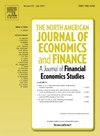Effect of digital finance on household financial asset allocation: a social psychology perspective
IF 3.9
3区 经济学
Q1 BUSINESS, FINANCE
North American Journal of Economics and Finance
Pub Date : 2025-04-03
DOI:10.1016/j.najef.2025.102427
引用次数: 0
Abstract
Over the past decade, digital finance has rapidly advanced, attracting significant attention due to its profound economic implications. Additionally, its development deeply affects social psychology and household behavior. This study examines the influence of digital finance on household financial asset allocation from a social psychological perspective, exploring how technological progress and economic transitions alter human behavior. Utilizing the China Household Finance Survey (CHFS) data from 2015, 2017, and 2019, combined with county-level digital finance data, empirical results show digital finance significantly promotes household participation in financial markets. This increased participation fosters a higher allocation toward risky financial assets, particularly equities, thereby enhancing portfolio diversification. From a psychological standpoint, such effects emerge as digital finance elevates individuals’ interest in and awareness of economic and financial matters, reshapes risk perceptions, and strengthens social interactions. Heterogeneity analysis further reveals that while the positive effects are somewhat weaker in rural and agriculturally registered households, they are significantly more pronounced in households characterized by higher education levels, greater average age, substantial assets, and entrepreneurial activities. Consequently, this research provides policymakers valuable insights into employing digital finance strategically to optimize household asset allocation and mitigate financial risks by shaping psychological and behavioral tendencies.
数字金融对家庭金融资产配置的影响:一个社会心理学视角
在过去的十年中,数字金融迅速发展,因其深刻的经济影响而备受关注。此外,它的发展还深刻影响着社会心理和家庭行为。本研究从社会心理学的角度考察了数字金融对家庭金融资产配置的影响,探讨了技术进步和经济转型如何改变人类行为。利用2015年、2017年和2019年中国家庭金融调查(CHFS)数据,结合县级数字金融数据,实证结果表明,数字金融显著促进了家庭参与金融市场。这种增加的参与促进了高风险金融资产,特别是股票的更高配置,从而增强了投资组合的多样化。从心理学的角度来看,数字金融提高了个人对经济和金融事务的兴趣和意识,重塑了风险认知,加强了社会互动,从而产生了这种影响。异质性分析进一步表明,虽然在农村和农业户籍家庭中,积极效应略弱,但在教育水平较高、平均年龄较大、资产丰富、创业活动较多的家庭中,积极效应更为明显。因此,本研究为政策制定者提供了有价值的见解,可以通过塑造心理和行为倾向,战略性地利用数字金融优化家庭资产配置,降低金融风险。
本文章由计算机程序翻译,如有差异,请以英文原文为准。
求助全文
约1分钟内获得全文
求助全文
来源期刊
CiteScore
7.30
自引率
8.30%
发文量
168
期刊介绍:
The focus of the North-American Journal of Economics and Finance is on the economics of integration of goods, services, financial markets, at both regional and global levels with the role of economic policy in that process playing an important role. Both theoretical and empirical papers are welcome. Empirical and policy-related papers that rely on data and the experiences of countries outside North America are also welcome. Papers should offer concrete lessons about the ongoing process of globalization, or policy implications about how governments, domestic or international institutions, can improve the coordination of their activities. Empirical analysis should be capable of replication. Authors of accepted papers will be encouraged to supply data and computer programs.

 求助内容:
求助内容: 应助结果提醒方式:
应助结果提醒方式:


